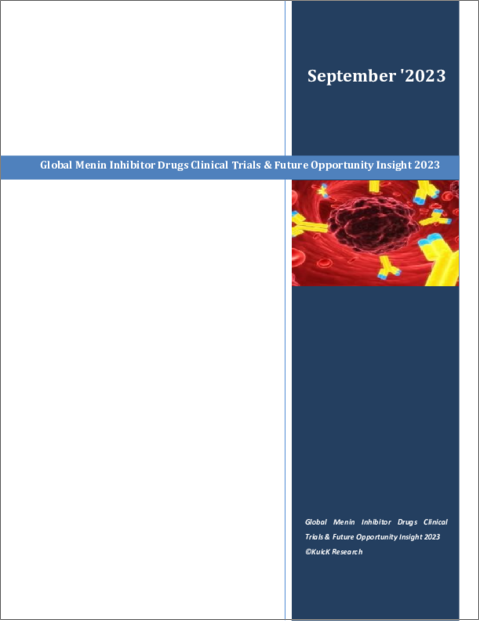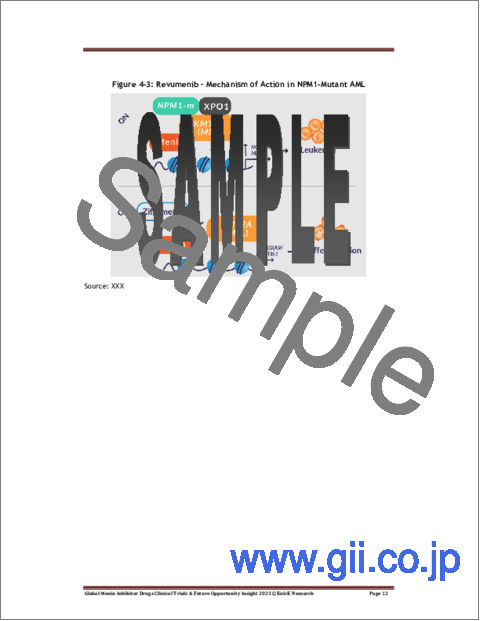|
|
市場調査レポート
商品コード
1354824
メニン阻害剤の世界市場:臨床試験と将来の機会(2023年)Global Menin Inhibitor Drugs Clinical Trials & Future Opportunity Insight 2023 |
||||||
|
|||||||
| メニン阻害剤の世界市場:臨床試験と将来の機会(2023年) |
|
出版日: 2023年09月01日
発行: KuicK Research
ページ情報: 英文 75 Pages
納期: 即日から翌営業日
|
- 全表示
- 概要
- 図表
- 目次
メニンは新世代のタンパク質であり、いくつかの疾患、特に癌の治療標的として応用されています。多発性内分泌腫瘍1型(MEN1)の研究を通じて良性腫瘍と最初に結びついたメニンタンパク質は、現在、癌と糖尿病における役割について研究され、その両方に使用される可能性を見出しています。このため、これらの疾患の治療に使用できるメニン阻害剤の開発が必要とされています。メニン阻害剤はまだ承認されていないが、メニン阻害剤のパイプラインには複数の有望な候補があり、それぞれが、市場で承認を受ける最初のクラスのメニン阻害剤になる可能性を秘めています。
メニン阻害剤の役割は複数の癌で確認されていますが、その中でも白血病が研究開発の中心となっているのは、この血液癌におけるメニンの役割が、使用されているすべての適応症の中で最もよく特徴付けられているからです。メニンタンパク質は混合系白血病(MLL)遺伝子の融合タンパク質の重要な補因子として働き、その変異は急性白血病の発症に関連しています。蔓延している癌とのこの関連は、この分野への関心を呼び起こし、多くの潜在的阻害剤の開発につながっています。
現在、いくつかのメニン阻害剤が白血病を対象に初期段階の臨床試験中であり、その中でもレブメニブ(旧名SNDX-5613)は現在最も有望な候補の一つです。RevumenibはSyndax Pharmaceuticals社によって開発されたもので、非常に強力なメニン阻害剤であり、現在進行中の同社の臨床試験において説得力のある臨床プロファイルを示しています。現在進行中のAUGMENT-101臨床試験では、急性白血病に対する単剤療法としてレブメニブを評価しており、AUGMENT-102臨床試験では、白血病に対する確立された標準治療とメニン阻害剤の相乗効果を調べるため、化学療法との併用でレブメニブを試験しています。
FDAは2022年12月、KMT2A再配列を有する再発または難治性の急性白血病患者の治療薬としてレブメニブを画期的治療薬に指定しました。また、NPM1遺伝子変異を有する再発または難治性の急性骨髄性白血病(AML)または急性リンパ芽球性白血病(ALL)の成人および青少年の治療薬として、FDAからファスト・トラック指定を受けています。ファストトラック指定は、FDAによる治験薬の審査を迅速化するもので、Revumenibは販売承認を得る最初のメニン阻害剤となる可能性があります。これらのFDA指定に先立ち、レブメニブは2021年12月にEMAから急性骨髄性白血病の治療薬として希少疾病用医薬品の指定も受けています。
当レポートでは、世界のメニン阻害剤市場について調査し、市場の概要とともに、メニン阻害剤の作用機序、癌治療における役割、地域別動向、臨床試験動向、および市場に参入する企業の競合動向などを提供しています。
目次
第1章 調査手法
第2章 メニン阻害剤のイントロダクション
- 概要と臨床進化
- 臨床開発
第3章 メニン阻害剤の臨床的意義
第4章 メニン阻害剤の作用機序
- 概要
- 臨床試験における主要な薬剤の作用機序
第5章 メニン阻害剤の適用および臨床試験、適応症別
- 血液癌
- 白血病
- リンパ腫
- 多発性骨髄腫
- 固形癌
- 糖尿病
第6章 メニン阻害剤の臨床調査イノベーション動向、地域別
- 米国
- 欧州
- カナダ
第7章 世界のメニン阻害剤市場情勢
- 現在の市場シナリオ
- 将来の臨床および商品化の機会
第8章 世界のメニン阻害剤の臨床試験の概要
- 会社別
- 国別
- 適応症別
- 患者セグメント別
- 相別
第9章 世界のメニン阻害剤の臨床試験、企業、適応症、および相別
- 前臨床
- 第I相
- 第I/II相
- 第II相
第10章 競合情勢
- Biomea Fusion
- BioNova Pharmaceuticals
- Daiichi Sankyo Company
- Easton Biopharmaceuticals
- Eilean Therapeutics
- HitGen
- Janssen Research & Development
- Sumitomo Pharma
List of Figures
- Figure 4-1: Ziftomenib - Mechanism of Action in Menin-KMT2A Pathway
- Figure 4-2: Revumenib - Mechanism of Action in KMT2A-Rearranged AML
- Figure 4-3: Revumenib - Mechanism of Action in NPM1-Mutant AML
- Figure 4-4: BMF-219 - Mechanism of Action in Leukemia
- Figure 4-5: BMF-219 - Mechanism of Action in Type 2 Diabetes Mellitus
- Figure 5-1: AUGMENT-101 Phase I/II Study - Initiation & Completion Years
- Figure 5-2: AUGMENT-102 Phase I Study - Initiation & Completion Years
- Figure 5-3: AALL2121 Phase II Study - Initiation & Completion Years
- Figure 5-4: Revumenib - FDA Designation Years
- Figure 5-5: KOMET-001 Phase I/II Study - Initiation & Completion Years
- Figure 5-6: KOMET-007 Phase I Study - Initiation & Completion Years
- Figure 5-7: KOMET-008 Phase I Study - Initiation & Completion Years
- Figure 5-8: COVALENT-101 Phase I Study - Initiation & Completion Years
- Figure 5-9: COVALENT-101 Phase I Study - Initiation & Completion Years
- Figure 5-10: COVALENT-102 Phase I Study - Initiation & Completion Years
- Figure 5-11: COVALENT-111 Phase I Study - Initiation & Completion Years
- Figure 8-1: Global - Menin Inhibitor Drugs Clinical Trials by Company (Numbers), 2023
- Figure 8-2: Global - Menin Inhibitor Drugs Clinical Trials by Country (Numbers), 2023
- Figure 8-3: Global - Menin Inhibitor Drugs Clinical Trials by Indication (Numbers), 2023
- Figure 8-4: Global - Menin Inhibitor Drugs Clinical Trials by Patient Segment (Numbers), 2023
- Figure 8-5: Global - Menin Inhibitor Drugs Clinical Trials by Phase (Numbers), 2023
List of Tables
- Table 5-1: Leukemia - Menin Inhibitors in Clinical Trials
- Table 6-1: US - Some Ongoing Clinical Trials for Menin Inhibitors
- Table 6-2: Europe - Some Ongoing Clinical Trials for Menin Inhibitors
- Table 6-3: Canada - Ongoing Clinical Trials for Menin Inhibitors
“Global Menin Inhibitor Drugs Clinical Trials & Future Opportunity Insight 2023” Report Highlights:
- Research Methodology
- Menin Inhibitors Drugs In Clinical Trials: > 10 Drugs
- Highest Clinical Trials Phase: Phase-II
- Global Menin Inhibitors Drugs Clinical Trials By Company, Indication & Phase
- Clinical Significance Of Menin Inhibitors
- Menin Inhibitors Clinical Research Innovation Trends By Region : US, Europe & Canada
Menin represents a new generation of proteins that have found application as a therapeutic target in several prevalent diseases, especially cancer. First linked with benign tumors through the studies on multiple endocrine neoplasia type 1 (MEN1), the menin protein is now being studied for its role in cancer and diabetes, finding potential use in both. This has generated the need for development of menin inhibitors that can be used to treat these diseases. Though no menin inhibitor has received approval yet, the pipeline of menin inhibitors is populated with multiple promising candidates, each having the potential to become the first-in-class menin inhibitor to receive market approval.
The role of menin inhibitors has been confirmed in multiple cancers, out of which leukemia is dominating the research and development landscape because menin's role in this hematological cancer is the most well characterized out of all indications it has found use in. The menin protein acts as an important cofactor for the fusion proteins of mixed lineage leukemia (MLL) gene, mutations in which are linked to the development of acute leukemia. This association with a prevalent cancer sparked interest in this field and has led to the development of many potential inhibitors.
Several menin inhibitors are now undergoing early phase clinical trials in leukemia, out of which Revumenib, previously known as SNDX-5613, is one of the most promising candidates currently. Revumenib was developed by Syndax Pharmaceuticals, and is a highly potent inhibitor of menin, which has shown a convincing clinical profile in the company's ongoing clinical trials. The ongoing AUGMENT-101 clinical trials is assessing Revumenib as a monotherapy in acute leukemias and the AUGMENT-102 clinical trial is testing Revumenib in combination with chemotherapy to determine the synergized effects of menin inhibitors with established standard of care for leukemia.
The FDA designated Revumenib as a breakthrough therapy in December 2022 the treatment of patients with relapsed or refractory acute leukemia who have a KMT2A rearrangement. In addition, it also has the Fast Track designation from the FDA for the treatment of adults and adolescents with relapsed or refractory acute myeloid leukemia (AML) or acute lymphoblastic leukemia (ALL) with an NPM1 mutation. The fast track designation expedites the review of investigational drugs by the FDA, which puts forth Revumenib as the potential first menin inhibitor to receive marketing approval. Prior to these FDA designations, Revumenib was also granted the orphan drug designation by the EMA in December 2021 for treating acute myeloid leukemia.
Another candidate that has garnered significant attention is BMF-219, a menin inhibitor developed by Biomea Fusion. BMF-219 made name for itself as the first menin inhibitor to enter clinical trials for the treatment of solid cancers. In contrast to other menin inhibitors in the clinical trials, Biomea has expanded the clinical assessment of BMF-219 to KRAS-driven non-small cell lung cancer, pancreatic cancer, and colorectal cancer. The interaction pathways between menin, KRAS and MYC have been established in research studies, which has allowed for this expansion in clinical trials for BMF-219. The trial is still in early clinical phase with the first patient receiving BMF-219 dosage in January this year.
BMF-219 is also an important menin inhibitor in sense that along with solid cancers, it is also the first menin inhibitor to undergo clinical trial for type 2 diabetes mellitus. The candidate showed glycemic control in patients ever after the treatment was stopped, which has been attributed to disruption of menin activity by the drug. In addition, Biomea has also planned a clinical trial to assess BMF-219 in type 1 diabetes. BMF-219 therefore represents a potential force that may be used to improve treatment outcomes of diabetic patients.
Therefore, menin inhibitors represent a significant breakthrough in the management of some prominent diseases marked by high prevalent rates, high mortality rates and a dearth of effective treatments. Ongoing research has been linking menin activities with several other gene products, which can potentially expand the use of menin inhibitors to several other indications. That being said, the global market for menin inhibitors is still in its nascent stage, with companies like Biomea Fusion and Syndax Pharmaceuticals emerging as pioneers of menin inhibitors research. The market holds immense future potential, both clinically and commercially, which needs to be tapped to exploit this newfound commercial opportunity.
Table of Contents
1. Research Methodology
2. Introduction To Menin Inhibitors
- 2.1. Overview & Clinical Evolution
- 2.2. Clinical Development
3. Clinical Significance Of Menin Inhibitors
4. Menin Inhibitors Mechanism of Action
- 4.1. Overview
- 4.2. Mechanism of Action For key Drugs In Clinical Trials
5. Menin Inhibitors Application & Clinical Trials By Indication
- 5.1. Hematological Cancers
- 5.1.1. Leukemia
- 5.1.2. Lymphoma
- 5.1.3. Multiple Myeloma
- 5.2. Solid Cancers
- 5.3. Diabetes
6. Menin Inhibitors Clinical Research Innovation Trends By Region
- 6.1. US
- 6.2. Europe
- 6.3. Canada
7. Global Menin Inhibitors Market Landscape
- 7.1. Current Market Scenario
- 7.2. Future Clinical & Commercialization Opportunities
8. Global Menin Inhibitors Drugs Clinical Trials Overview
- 8.1. By Company
- 8.2. By Country
- 8.3. By Indication
- 8.4. By Patient Segment
- 8.5. By Phase
9. Global Menin Inhibitors Drugs Clinical Trials By Company, Indication & Phase
- 9.1. Preclinical
- 9.2. Phase-I
- 9.3. Phase-I/II
- 9.4. Phase-II
10. Competitive Landscape
- 10.1. Biomea Fusion
- 10.2. BioNova Pharmaceuticals
- 10.3. Daiichi Sankyo Company
- 10.4. Easton Biopharmaceuticals
- 10.5. Eilean Therapeutics
- 10.6. HitGen
- 10.7. Janssen Research & Development
- 10.8. Sumitomo Pharma






